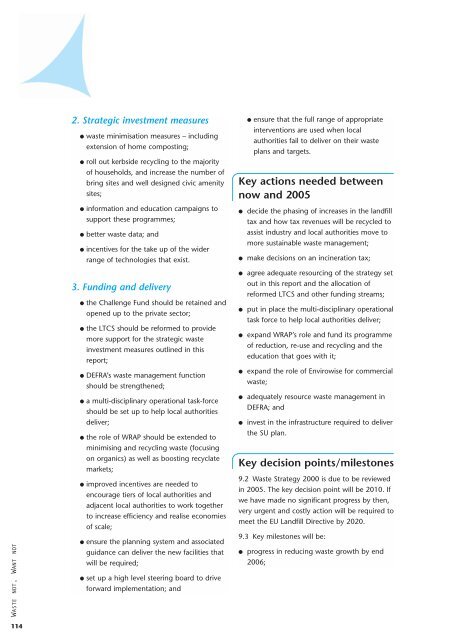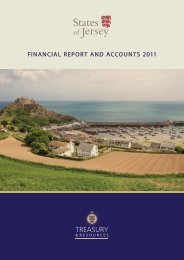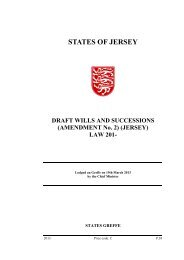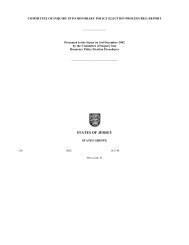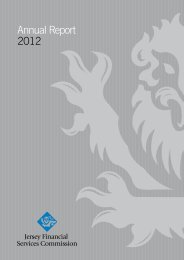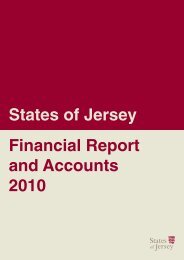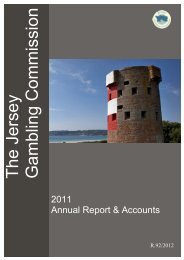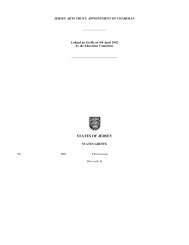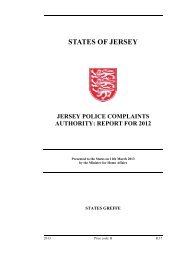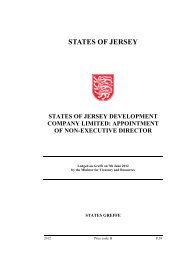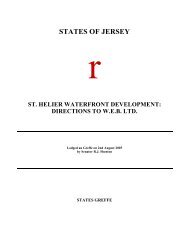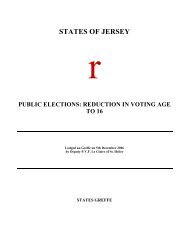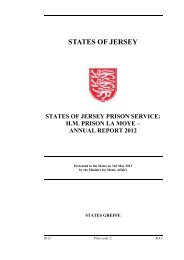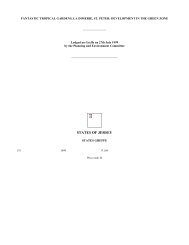Waste not want not - States Assembly
Waste not want not - States Assembly
Waste not want not - States Assembly
Create successful ePaper yourself
Turn your PDF publications into a flip-book with our unique Google optimized e-Paper software.
WASTE NOT, WANT NOT<br />
114<br />
2. Strategic investment measures<br />
● waste minimisation measures – including<br />
extension of home composting;<br />
● roll out kerbside recycling to the majority<br />
of households, and increase the number of<br />
bring sites and well designed civic amenity<br />
sites;<br />
● information and education campaigns to<br />
support these programmes;<br />
● better waste data; and<br />
● incentives for the take up of the wider<br />
range of technologies that exist.<br />
3. Funding and delivery<br />
● the Challenge Fund should be retained and<br />
opened up to the private sector;<br />
● the LTCS should be reformed to provide<br />
more support for the strategic waste<br />
investment measures outlined in this<br />
report;<br />
● DEFRA’s waste management function<br />
should be strengthened;<br />
● a multi-disciplinary operational task-force<br />
should be set up to help local authorities<br />
deliver;<br />
● the role of WRAP should be extended to<br />
minimising and recycling waste (focusing<br />
on organics) as well as boosting recyclate<br />
markets;<br />
● improved incentives are needed to<br />
encourage tiers of local authorities and<br />
adjacent local authorities to work together<br />
to increase efficiency and realise economies<br />
of scale;<br />
● ensure the planning system and associated<br />
guidance can deliver the new facilities that<br />
will be required;<br />
● set up a high level steering board to drive<br />
forward implementation; and<br />
● ensure that the full range of appropriate<br />
interventions are used when local<br />
authorities fail to deliver on their waste<br />
plans and targets.<br />
Key actions needed between<br />
now and 2005<br />
●<br />
●<br />
●<br />
●<br />
●<br />
●<br />
●<br />
●<br />
decide the phasing of increases in the landfill<br />
tax and how tax revenues will be recycled to<br />
assist industry and local authorities move to<br />
more sustainable waste management;<br />
make decisions on an incineration tax;<br />
agree adequate resourcing of the strategy set<br />
out in this report and the allocation of<br />
reformed LTCS and other funding streams;<br />
put in place the multi-disciplinary operational<br />
task force to help local authorities deliver;<br />
expand WRAP’s role and fund its programme<br />
of reduction, re-use and recycling and the<br />
education that goes with it;<br />
expand the role of Envirowise for commercial<br />
waste;<br />
adequately resource waste management in<br />
DEFRA; and<br />
invest in the infrastructure required to deliver<br />
the SU plan.<br />
Key decision points/milestones<br />
9.2 <strong>Waste</strong> Strategy 2000 is due to be reviewed<br />
in 2005. The key decision point will be 2010. If<br />
we have made no significant progress by then,<br />
very urgent and costly action will be required to<br />
meet the EU Landfill Directive by 2020.<br />
9.3 Key milestones will be:<br />
●<br />
progress in reducing waste growth by end<br />
2006;


